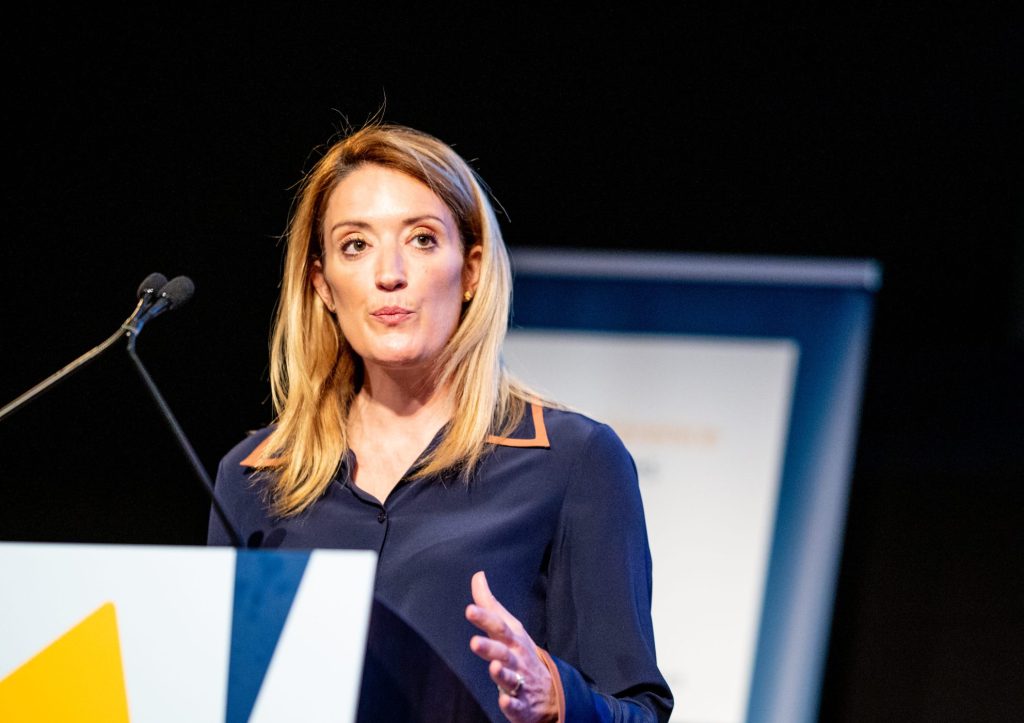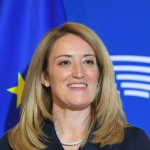Le véritable pouvoir de l’UE est de transformer des pays et des vies
Message de la Présidente du Parlement européen, Roberta Metsola, lors de la Conférence Jacques Delors à Paris sur «Les valeurs démocratiques dans l’UE et la promesse de paix qui est au cœur de l’intégration européenne».

Le sujet d’aujourd’hui fait l’objet de discussions depuis plusieurs décennies. L’Institut Jacques Delors a joué un rôle central dans l’évolution de ce débat. Ses contributions se sont appuyées sur le travail d’experts, ajoutant des facettes supplémentaires à la conception riche et complexe de ce que l’on appelle aujourd’hui le «mode de vie européen».
Et pourtant, lorsque les chars de Poutine sont entrés en Ukraine le 24 février, le débat a pris une tout autre réalité.
Je représente ici la dernière génération de l’Union qui se souvient vaguement d’un monde où la démocratie était constamment menacée. Quiconque né après moi n’a jamais connu que la paix.
La guerre de Poutine contre l’Ukraine représente une prise de conscience de notre mémoire collective défaillante. Nous étions tellement habitués à l’idée d’une Europe libre et démocratique que nous avions oublié que certains, y compris à nos frontières, pensent qu’il ne devrait pas du tout y avoir d’avenir pour la démocratie.
Notre jugement collectif, en réponse à l’interdépendance croissante entre les nations du monde, qu’il s’agisse de nos économies, de nos ambitions climatiques ou même de l’approvisionnement en énergie, a été altéré par notre naïveté. Une naïveté qui nous a portés à croire que la méthode de travail européenne, par le dialogue et l’échange, s’étendrait naturellement à nos voisins hostiles.
Les signaux d’alerte étaient pourtant bien là. Les États Baltes, la Finlande et la Pologne tirent la sonnette d’alarme depuis des années. Nous avons vu le recul de la démocratie en Russie, les attaques hybrides contre nos processus démocratiques, ce qui s’est passé en Crimée, ce qu’ils ont fait à Navalny, comment ils ont tenté d’écraser la démocratie en Biélorussie, et malgré tout, lorsque l’idéologie révisionniste de Poutine a été mise en actes par son armée, nous nous sommes laissé surprendre.
Cela n’avait pourtant rien de surprenant.
L’Ukraine et sa population affrontent depuis 129 terribles jours une guerre brutale et illégale. Alors que les bombes russes tuent aveuglement sans relâche, alors que les soldats russes continuent de violer les femmes ukrainiennes, alors que des millions d’Ukrainiens fuient leur pays et que des millions d’autres fuiront à leur tour, l’Ukraine se tourne aujourd’hui vers l’Europe en quête de soutien.
Ils se tournent vers nous, et nous devons nous interroger et penser aux responsabilités qui sont les nôtres, car ils ne se battent pas seulement pour leur patrie, ils ne se battent pas seulement pour leurs foyers, ils se battent pour préserver les valeurs qui sont le fondement de notre mode de vie: alors qu’il s’agit de la liberté, de la démocratie et de l’état de droit. Ces mots ne peuvent être simplement laissés de côté parce qu’ils ne nous conviennent plus. Nous l’avons peut-être fait parce que nous les tenions pour acquis. Mais les Ukrainiens savent aujourd’hui, comme c’est le cas depuis longtemps, peut-être avant même que nous ne l’admettions nous-mêmes, que notre projet européen est la force la plus importante qui s’oppose au passé révisionniste de Poutine, lardé de sphères d’influence, d’états vassaux et d’un rideau de fer.
Le 24 février dernier, nous avons tardivement pris conscience que la lutte de l’Ukraine était aussi celle de l’Europe.
La semaine dernière, le Conseil européen a pris la décision inédite d’accorder à l’Ukraine et à la Moldavie le statut de pays candidat à l’Union, marquant ainsi un tournant pour l’intégration européenne. Ce qui s’est passé la semaine dernière n’était pas du tout envisageable en janvier lorsque j’ai commencé mon mandat et même il y a cinq à six semaines de cela. Je n’aurais jamais cru que l’Ukraine et la Moldavie seraient des pays candidats à l’adhésion. J’étais autour de cette table la semaine dernière au Conseil européen. J’ai pensé que ce serait plus difficile à faire entendre, mais nous avons tout de suite compris que nous devions prouver à l’Ukraine, à l’Europe, à tous nos citoyens, en tant que représentants élus, ainsi qu’au monde entier, qu’aucune décision n’était difficile à prendre dès que nos valeurs étaient remises en question. Cette preuve d’unité a renforcé notre situation sécuritaire et géopolitique et a également conforté l’Ukraine et tout pays qui compte sur l’Europe, ce bastion de la protection et de la démocratie qu’elle n’a jamais cessé d’être.
Les prochaines étapes seront cruciales et très difficiles. Une certaine lassitude de la guerre va inévitablement prendre le pas; il nous appartient de veiller à ne pas redevenir complaisants.
Voilà pourquoi nous devons redoubler nos efforts de soutien à l’Ukraine tout en dressant un bilan de ces évolutions géopolitiques fondamentales.
Voilà pourquoi nous devons reconsidérer les termes de notre dialogue avec les autocrates et changer le regard que nous leur portons. Parce que nos mères et pères fondateurs ont travaillé avec acharnement pour mettre en place un système qui empêche tout retour aux horreurs de la guerre.
C’est à nous de protéger l’ordre fondé sur les règles et les valeurs que nous défendons. Nous devons renforcer la relation d’interdépendance entre des nations et des peuples qui sont fiers de leurs différences, mais qui savent que, dans ce monde nouveau, l’avenir existe uniquement si nous sommes unis. Nous devons donc comprendre que l’interdépendance est inévitable, et aussi assumer notre responsabilité au sein des enceintes internationales. Cette responsabilité incombe à l’Europe, et en tant que tel, nous ne pouvons plus la rejeter sur quelqu’un d’autre. Car nous avons pu constater que ces autres pouvoirs qui ne souhaitaient pas nous rejoindre, ou que tous ces autres pouvoirs irresponsables ou imprévisibles ou autocratiques, avaient des positions et des idées néfastes quant à ce qu’ils pouvaient imposer aux pays qui sont candidats à l’adhésion à l’Union et qui patientent depuis des décennies, alors qu’on le leur a promis, année après année, et ont lutté pour que des élections se tiennent et les ont perdues, pour ces pays, notre porte sera ouverte. Il nous appartient de définir les règles, les principes et les valeurs qui mettent en évidence la manière dont nous collaborons avec d’autres nations et dont elles collaborent avec nous. Si nous ne le faisons pas, d’autres le feront.
Comme l’a brillamment déclaré Jacques Delors il y a trente ans: «Il nous faut, pour résister aux forces de la fragmentation, du protectionnisme et de l’exclusion, passer du seul constat de l’interdépendance à la gestion de celle-ci. En vue d’objectifs et selon des règles acceptés en commun».
Mesdames et messieurs, nous devons instaurer un nouveau paradigme, par lequel l’Union est maître de son propre destin, et le détermine, quelle que soit la menace présente à l’Est. Nous devons être suffisamment ambitieux et courageux pour développer une stratégie à long terme, une stratégie qui nous permette de réaliser une avancée décisive pour protéger nos valeurs. L’unité dont nous avons fait preuve dans l’Union et au-delà doit demeurer notre modèle pour l’avenir.
Nous ne devons jamais oublier le pouvoir qu’a l’Europe de transformer des pays et des vies. Notre projet de paix européen est peut-être imparfait, mais il a inspiré et a permis d’obtenir des changements que beaucoup pensaient impossibles. Au fond, notre Europe c’est une question d’espoir.
L’espoir en l’avenir. L’espoir de voir nos libertés prévaloir. L’espoir d’avancer et d’inspirer le changement.
Je sais que nous pouvons encore avancer.
Je sais que nous pouvons encore inspirer.
Je vous remercie.




